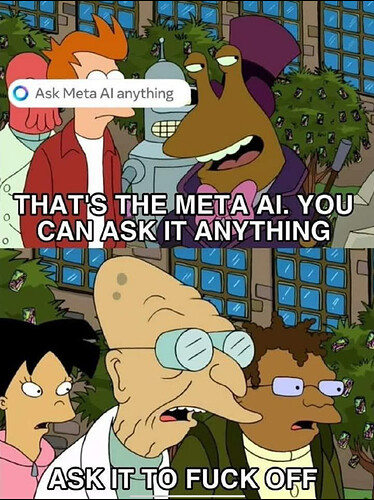Who knows? All i see is rats fighting and eating each other.
The loser gets eaten? I’m not immediately opposed to that.
It’s almost like having cameras everywhere at all times on all things was a bad idea… But techbros said it was fine… /s
For your own safety, citizen!
Maybe they can go fuck themselves?
Meta Says It’s Okay to Feed Copyrighted Books Into Its AI Model Because They Have No “Economic Value”
That’s been going on for awhile. Half the time when I use Instacart, the shopper’s name is a traditionally female one, with a picture of a woman on the profile, and then some big burly dude drives up and delivers my groceries.
From the article:
Thus there’s no market in paying authors to use their copyrighted works, Meta says, because “for there to be a market, there must be something of value to exchange,” as quoted by Vanity Fair — “but none of [the authors’] works has economic value, individually, as training data.” Other communications showed that Meta employees stripped the copyright pages from the downloaded books.
So the article makes it sound like this is separate from the fair use argument Meta is making. It isn’t. It’s an integral part of the fair use argument.
Fair use doesn’t have a black letter law definition. It has to be evaluated on a case by case basis, and involves four factors. These four factors are analyzed to see if they way in favor of, or against, fair use. Also, each factor is not equally weighted. One of the big ones is transformative use. This is misunderstood by most people. It doesn’t just mean that the copy is different than the original. The bigger part of this factor is whether the purpose of the copy is different than the purpose of the original. The classic example is using a clip from a movie to review the movie. The purpose of the review is different. Its purpose is criticism and information. The purpose of the movie is to entertain. That’s a transformative use. AI doesn’t do this. It changes the original, but the purpose is the same.
Two of the factors don’t weigh that heavily, usually. One is the nature of the original. If it’s a creative work, that weighs against fair use. If it’s purely factual, that weighs for fair use. The classic example is that you can’t copyright the phone book. The third is how much of the original was used in the copy. Reaction videos often get into trouble here. If you film yourself reacting to someone else’s video, and you play the entire original video, that’s going to hurt your fair use defense.
The last factor is arguably the most important because the whole point of copyright protection is to protect the market for the original work. This factor is does the copy affect the market of the original work. So what the AI companies are arguing here is not that there is no market for the original writings, but that there is no market for the original writings as an AI training tool. In other words, if you force these companies to compensate the original creators, they’re not going to pay them much because the contribution of each individual work to the AI created work is minuscule.
If I were the attorney for the plaintiffs, I would argue that’s the wrong way to look at it. I would argue that due to the way these LLMs work, you can’t really separate out the effect of individual works used in training like that. That without the collective use of the original works, there would be no AI created works at all and so the originals are almost entirely responsible for the entire market for AI.
It will be interesting to see how this plays out.
Thank you for your thoughtful analysis!
One, non copyright related issue that struck me is the logical fallacy they are promoting in trying to say it is okay to use copyrighted books. (And pirated ones, to boot!)
Basically, they are arguing that the works have little to no value as a data set to train their AI. Except… they are using it as a data set to train their AI, which therefore means it has intrinsic value. Otherwise, why waste their time and other resources?
They don’t get to determine the value of a work: the copyright/IP owners do. If they decide the owners want too much for the work, they are welcome to not use them. The argument that an individual work makes up a negligible portion of the entire training set and therefore compensation owed is likewise negligible is just an embarrassingly poor distraction.
I hope they get annihilated in the suit, and the authors get Hollywood option level payments for each stolen work.
You’re right, except that this is still very much at the heart of the copyright issue. The entire purpose of copyright is to protect markets. AI (the current LLM brand of AI) will continue to need new works to train on or it will stagnate and die because it isn’t actually intelligent at all. But if they aren’t required to compensate the creators of those new works, while simultaneously killing the market for new works, those new works will start to disappear.
Thanks again for the insights!
I’d love to see the argument in court that Meta should be paying not only for the works used, but for the authors’ retirement.
Remember Apple Vision Pro, that goofy headset that we all mocked then promptly forgot about around a year ago? Apparently Tim Cook is still deeply invested in the idea and wants augmented reality to be his legacy so that he can finally live up to what Steve Jobs did with the iPhone. And Zuckerberg is still working on that stuff too.
The first iPhone came out almost 18 years ago, so it’s practically a legal adult now. And Apple has done pretty much nothing notable since then. Man, these guys really are out of ideas.
You don’t consider transitioning to their own chips for the computers notable?



